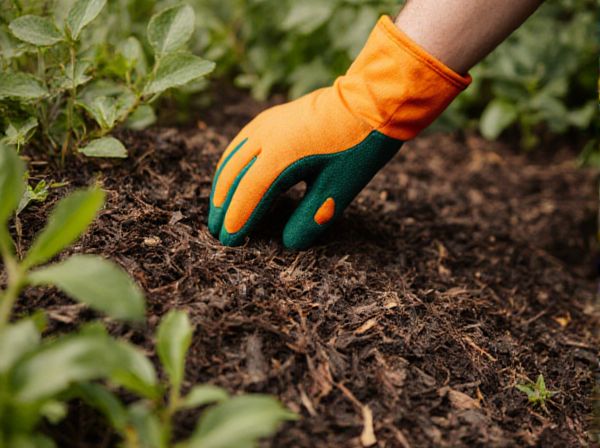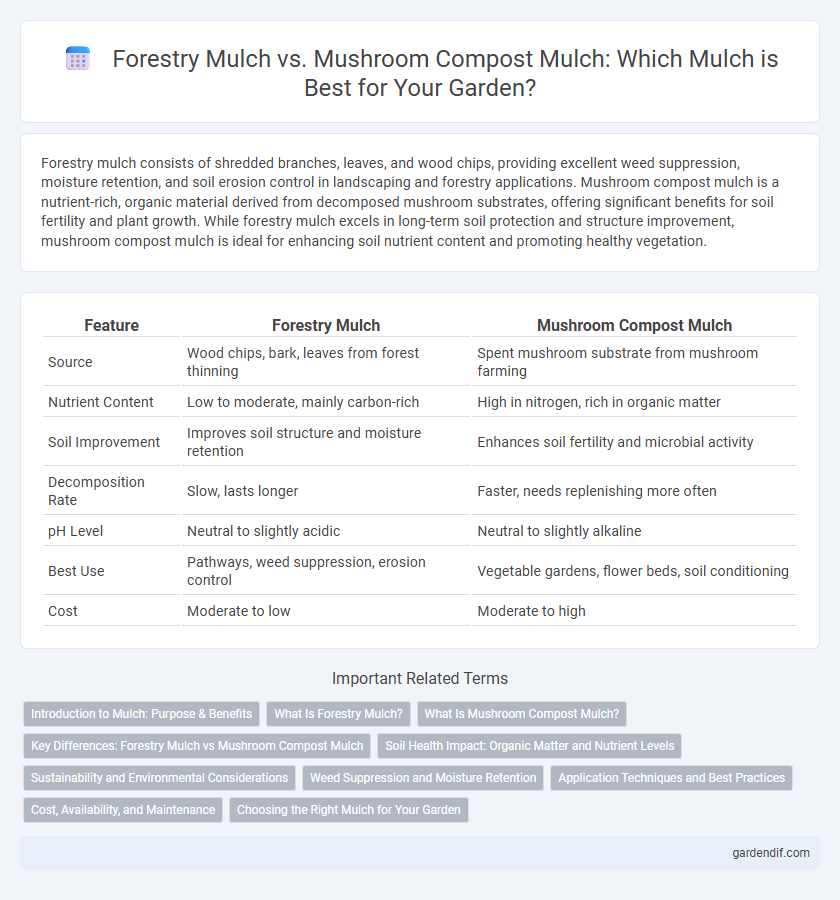
Forestry mulch vs Mushroom compost mulch Illustration
Forestry mulch consists of shredded branches, leaves, and wood chips, providing excellent weed suppression, moisture retention, and soil erosion control in landscaping and forestry applications. Mushroom compost mulch is a nutrient-rich, organic material derived from decomposed mushroom substrates, offering significant benefits for soil fertility and plant growth. While forestry mulch excels in long-term soil protection and structure improvement, mushroom compost mulch is ideal for enhancing soil nutrient content and promoting healthy vegetation.
Table of Comparison
| Feature | Forestry Mulch | Mushroom Compost Mulch |
|---|---|---|
| Source | Wood chips, bark, leaves from forest thinning | Spent mushroom substrate from mushroom farming |
| Nutrient Content | Low to moderate, mainly carbon-rich | High in nitrogen, rich in organic matter |
| Soil Improvement | Improves soil structure and moisture retention | Enhances soil fertility and microbial activity |
| Decomposition Rate | Slow, lasts longer | Faster, needs replenishing more often |
| pH Level | Neutral to slightly acidic | Neutral to slightly alkaline |
| Best Use | Pathways, weed suppression, erosion control | Vegetable gardens, flower beds, soil conditioning |
| Cost | Moderate to low | Moderate to high |
Introduction to Mulch: Purpose & Benefits
Forestry mulch, derived from chipped tree branches and bark, enhances soil moisture retention and suppresses weeds through its dense organic layer, promoting healthy forest ecosystems. Mushroom compost mulch, rich in decomposed organic matter and nutrients, improves soil fertility and microbial activity, supporting vigorous plant growth and disease resistance. Both types of mulch contribute to improved soil structure, temperature regulation, and long-term plant health, making them essential components for sustainable mulching practices.
What Is Forestry Mulch?
Forestry mulch is a soil amendment made from shredded tree bark, wood chips, and other forest-derived organic materials. Unlike mushroom compost mulch, which is rich in nutrients from decomposed fungi and organic waste, forestry mulch primarily enhances soil structure and moisture retention without significantly altering soil pH. This mulch type is highly effective in preventing erosion, suppressing weeds, and improving soil aeration in reforestation and landscaping projects.
What Is Mushroom Compost Mulch?
Mushroom compost mulch is a nutrient-rich organic material made from the byproducts of mushroom farming, including stalks, straw, and manure, which are composted to create a fertile soil amendment. It improves soil structure, enhances moisture retention, and provides essential nutrients such as nitrogen, phosphorus, and potassium, promoting healthy plant growth. Unlike forestry mulch derived from shredded tree bark and wood chips, mushroom compost mulch offers higher nutrient content and faster decomposition rates, making it ideal for vegetable gardens and flower beds.
Key Differences: Forestry Mulch vs Mushroom Compost Mulch
Forestry mulch, derived from shredded trees and branches, provides a coarse texture that enhances soil aeration and prevents erosion, while mushroom compost mulch, created from decomposed mushroom farm waste, offers rich organic matter that boosts soil fertility and moisture retention. Forestry mulch decomposes slowly, making it ideal for long-term ground cover in landscapes and erosion control projects, whereas mushroom compost mulch breaks down faster, quickly supplying nutrients to garden plants. The key differences lie in their composition, decomposition rate, and primary applications, with forestry mulch favored for structural soil benefits and mushroom compost mulch valued for nutrient enrichment.
Soil Health Impact: Organic Matter and Nutrient Levels
Forestry mulch significantly enhances soil health by increasing organic matter content and improving nutrient cycling through the decomposition of woody materials. Mushroom compost mulch contributes high levels of nutrients such as nitrogen, phosphorus, and potassium, promoting soil fertility and microbial activity. Combining both mulches can create a balanced soil environment, optimizing organic matter and nutrient availability for plant growth.
Sustainability and Environmental Considerations
Forestry mulch, derived from shredded tree biomass and bark, offers sustainable benefits by recycling forest residues and reducing waste, promoting soil health through slow decomposition and carbon sequestration. Mushroom compost mulch, produced from spent mushroom substrate, enhances soil fertility with rich organic matter but may contain salt or chemical residues affecting sensitive plants and ecosystems. Choosing forestry mulch supports long-term environmental sustainability with minimal chemical impact, while mushroom compost requires careful sourcing to avoid potential soil and water contamination.
Weed Suppression and Moisture Retention
Forestry mulch excels in weed suppression due to its coarse texture and ability to create a dense barrier that limits sunlight exposure, effectively inhibiting weed growth. Mushroom compost mulch offers superior moisture retention because of its fine, organic composition that enhances soil water-holding capacity and slowly releases nutrients. Combining these mulches can optimize both weed control and soil moisture, benefiting plant health and productivity.
Application Techniques and Best Practices
Forestry mulch is applied using heavy machinery to clear land, improve soil structure, and enhance drainage, making it ideal for large-scale landscaping and erosion control projects. Mushroom compost mulch, rich in organic nutrients, is best spread manually or with light equipment around garden beds and plants to improve soil fertility and moisture retention. For optimal results, forestry mulch should be evenly distributed to prevent soil compaction, while mushroom compost mulch requires regular replenishment and careful management to avoid nutrient imbalances.
Cost, Availability, and Maintenance
Forestry mulch is generally more cost-effective and widely available due to its production from logging residues, making it an excellent choice for large-scale landscaping projects. Mushroom compost mulch tends to be pricier and less available as it is a byproduct of mushroom farming, offering richer nutrients but requiring more frequent maintenance to manage odor and moisture levels. Both mulches serve distinct purposes, with forestry mulch excelling in durability and mushroom compost mulch providing enhanced soil fertility.
Choosing the Right Mulch for Your Garden
Forestry mulch, derived from shredded tree bark and wood chips, is ideal for long-lasting weed suppression and moisture retention in garden beds, promoting healthy soil structure. Mushroom compost mulch, rich in organic matter and nutrients, enhances soil fertility and supports vigorous plant growth, especially in vegetable and flower gardens. Choosing the right mulch depends on garden goals: opt for forestry mulch for durability and soil protection or mushroom compost for nutrient enrichment.
Forestry mulch vs Mushroom compost mulch Infographic

 gardendif.com
gardendif.com